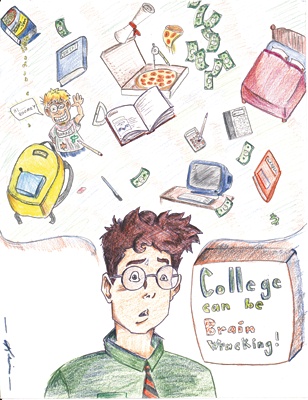All Nonfiction
- Bullying
- Books
- Academic
- Author Interviews
- Celebrity interviews
- College Articles
- College Essays
- Educator of the Year
- Heroes
- Interviews
- Memoir
- Personal Experience
- Sports
- Travel & Culture
All Opinions
- Bullying
- Current Events / Politics
- Discrimination
- Drugs / Alcohol / Smoking
- Entertainment / Celebrities
- Environment
- Love / Relationships
- Movies / Music / TV
- Pop Culture / Trends
- School / College
- Social Issues / Civics
- Spirituality / Religion
- Sports / Hobbies
All Hot Topics
- Bullying
- Community Service
- Environment
- Health
- Letters to the Editor
- Pride & Prejudice
- What Matters
- Back
Summer Guide
- Program Links
- Program Reviews
- Back
College Guide
- College Links
- College Reviews
- College Essays
- College Articles
- Back
The Four-Year Battle
IS a college degree the way to go in this generation? Is the debt and hardships that are experienced by college graduates even worth it? This is something I ask myself everyday as I check my bank account and see that sometimes I don’t even have $5 to my name, or enough spare change to treat myself to a coffee. So why do we do this? Why is it that millions of people go through 4 years of schooling and come out with a piece of paper, a bunch of debt, and not a lot of job options?
74% of people agreed that a college degree is necessary to get ahead in life and it’s true. The stereotypical college leading to a bachelor’s degree at the end of four years works fine for the children of parents who have plenty of money. It works even better for top students from all backgrounds who are drawn toward academics. But most 18-year-olds are not from families with plenty of money, not top students, and not drawn toward academics.
In 1985, 39% of people agreed that most people can afford to pay for college, versus 2011 where only 22% of people agreed most could afford it. Since then, tuition has risen almost 1,200 percent in the last 35 years, and the sticker price for many four-year private colleges and out-of-state public universities exceeds $250,000. Even at state universities, the average four-year cost for residents is more than $80,000 for tuition, room, board and expenses. So why is something that is seemingly so necessary, so much money? For some, it isn’t even a possibility. 48% of people who did not finish or attend college said that it was because they couldn’t afford school (Pew).
Society today plays a big role in attaining college degree. The millennial generation is supposedly the “best-educated generation in history” (Pew), with 34% having a bachelor’s degree. In contrast, only 13% of 25- to 32-year-olds in 1965 had a degree. In one study, 94% of parents said that they expect their child to attend college, which only pressures people to go even more. In this day and age, there is a huge stigma about community colleges. One Student at University of Minnesota said “community colleges I considered for those who weren’t intelligent enough to get into anywhere else.” It’s as if the only thing that is acceptable nowadays is a degree from a 4-year college.
So what about the Steve Jobs, and the Mark Zuckerbergs, the guys that are self-made with no college experience? After one semester at Reed College in Portland, Oregon, Steve Jobs dropped out. He then went on to get work experience which led him to starting up the company Apple. He proved to be successful without college, just like Mark Zuckerberg who is the Co-founder, chairman, and CEO of Facebook. Zuckerberg is now worth $27.5 Billion after dropping out of Harvard University. 50% of college graduates said if they had gained more work experience while they were undergraduates, they would have been prepared to get the job that they wanted. It’s people like Steve Jobs and Mark Zuckerberg that reinforce that statement, because they went on to become successful after taking the traditional working route.
However, 46% of employed adults ages 25-32 said their education was very useful in preparation for a job or career. After completing their degree program, many people are able to find their passion because they were exposed to it in college. According to Pew Research Center, College-educated Millennials are more likely to see themselves on a career path, rather than just working at a job to get them by. Staying on a career path then leads to a more stable source of income. Typically, college graduates earn $650,000 more than a typical high school graduate over the course of a lifetime, but it is still a very large investment (The Rising Cost of Not Going to College). However, the higher the degree, the lower the unemployment rate and the higher the median weekly salary.
All though it may seem that the negatives outweigh the positives, I can assure you a college degree is worth it. All though the amount of debt incurred is enormous, and after graduation the odds are stacked against new grads, it’s a climb that’s worth the view.

Similar Articles
JOIN THE DISCUSSION
This article has 0 comments.
